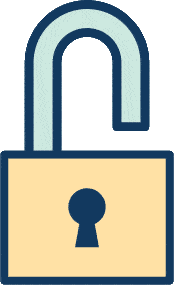Imagine for a moment that you’re just trying to go about your day when suddenly you feel it. Your heart starts beating rapidly, you’re finding it hard to take a breath, your thoughts are racing, and you feel sweaty and lightheaded like you may pass out. What is going on?
If you experience any of these symptoms or know someone else who does, it is more than likely to be anxiety. 19.1% of adults 18 and older in the U.S. experience some form of anxiety.
But there are many myths about anxiety that can cause people to treat those suffering from anxiety differently or not take it seriously. If you want to find out more about anxiety for yourself or someone you love, keep reading below to find out the 5 most common myths about anxiety.
1. Top Common Myths About Anxiety: Anxiety Is Made-Up or Phony
Fact: The most common myths about anxiety claim that it is somehow fake. As stated above, 19.1% of the adult population over 18 in the U.S. suffers from some form of anxiety. While 19.1% doesn’t seem like that much, to put it into perspective, it equals about 48 million people across the nation.
When the COVID-19 pandemic started in 2020, it triggered fears in many people who worried for their own health and safety, as well as for those they loved. Job concerns were also a big issue as many companies completely shut down or let go of a large portion of their in-person workforces to stay afloat.
Individuals and families also worried about losing their homes. If they weren’t able to keep their jobs, they could no longer keep up with their rent or mortgage payments and could be evicted.
In the first year of the pandemic alone, anxiety and depression rates rose 25% worldwide. Proving that anxiety is a very real condition that should always be taken seriously.
2. Myth: People Always Fake Anxiety for Attention
Fact: While there are conditions where some people may fake an illness for attention, those who have anxiety sometimes can’t control when their anxiety takes over. This is especially true when their anxiety is accompanied by panic attacks.
Panic attacks are a symptom of anxiety that can come on suddenly for no apparent reason. But when investigated further, some underlying causes could be overstimulation, loud noises, big crowds, or prolonged periods of stress.
Anxiety can also sometimes be directly linked to a reason for a panic attack breakdown. Such as extreme nervousness or worry over a medical procedure, a dentist’s office visit, a big test, a job interview, or a public performance.
Panic attacks also bring on a whole host of real physical and mental symptoms that can cause great distress and fatigue to the person experiencing them.
In no way should a person’s sudden breakdown due to anxiety be perceived as faking an episode just to get special attention or to gain sympathy. These myths about anxiety are hurtful. Accusing someone of faking their anxiety is wrong because the panic attacks that come with anxiety simply can’t be helped.
Oftentimes, the last thing a person with anxiety wants is to be the center of attention.
3. Myth: Having Anxiety Means You’re Weak
Fact: For those who do believe that anxiety is real, they will still unfairly attach unnecessary stigmas to it. Their myths about anxiety will create unfair viewpoints of anxiety sufferers as weak individuals who just need to toughen up or get over their anxiety.
These anxiety myths are a dangerous mindset to have, especially when dealing with people who have anxiety. If they feel unfairly judged or labeled, it could prevent them from seeking out the necessary treatments and help that they need.
Those with anxiety will also often cover up their true emotions and withdraw from social events or stop engaging in outside activities due to the negative stigma of associating anxiety with weakness. They will bury their feelings and try to self-medicate with drugs and alcohol, which can lead to worsening anxiety, more frequent panic attacks, and depression later on.
If anything, those with anxiety are strong and brave individuals who fight battles within themselves every day and still find a way to keep going forward.
4. Myth: Anxiety Goes Away On Its Own
Fact: While some panic attacks can subside on their own after around 15 to 20 minutes, in no way does this mean that they are cured of anxiety for good. Some individuals can still have anxiety for the rest of their lives.
There are medications and therapies that can lessen the frequency of panic attacks or the severity of anxiety symptoms to improve a person’s quality of life, but their anxiety may never truly just go away on its own.
Counseling can help a person manage their anxiety by giving them anxiety tips and methods for coping with the symptoms that cause them the most problems in their daily life. These anxiety remedy methods could include journaling their feelings, art therapy, visualization, positive affirmations, and breathing techniques.
One of the myths about anxiety is that it’s not always a quick fix. It takes a lot of time, effort, and most importantly of all, care and understanding from those around them.
5. Myth: There’s Only One Kind of Anxiety
Fact: Another of the myths about anxiety is the word “anxiety”, which is just a broad blanket term applied to a person showing the symptoms of the disorder. But anxiety is so much more than that. It includes many facets and areas.
Anxiety can exist for seemingly no real reason, causing undue and excessive worry and fear for the individual. This is known as Generalized Anxiety Disorder (GAD)
A person can also experience certain and specific forms of anxiety that come in the form of phobias. For example, agoraphobia is the fear of leaving the house and going outside, which can be debilitating.
Social Anxiety Disorder is a form of anxiety specifically tied to extreme discomfort involved with everyday social interactions. With Social Anxiety Disorder, it can be hard to make friends and keep friend-based relationships going.
It can also cause problems in workplace environments and the ability to maintain relationships with co-workers and bosses. Social Anxiety can even make it difficult to navigate romantic relationships.
OCD and PTSD can also bring about anxiety problems relating to a specific trauma or fear. Separation Anxiety, often associated with children at school, can also apply to adults who have difficulty functioning on their own without a particular parent or caregiver around.
A Panic Disorder involves experiencing frequent and severe panic attacks. This can significantly cause disruptions in trying to live a normal life for fear of always setting off more panic attacks.
Find Like-Minded Disabled Connections and Life Advice at Special Bridge
With these and other myths about anxiety still floating around, it can cause individuals with anxiety to feel disconnected from the world around them. That’s why there’s Special Bridge.
Special Bridge isn’t just a dating site, it’s a social media platform and app for those with disabilities and special needs that connects you to other people just like you all over the world. So you can find the like-minded connections you want from those who understand.
Special Bridge also has informative blog posts that address the topics that mean the most to you.
Click Here to join Special Bridge today.




1 comments:
Brian lanier
September 30, 2022 at 3:38 pm
I have anxiety issues but there is hardly anybody on this site that lives in my area of las vegas nevada.